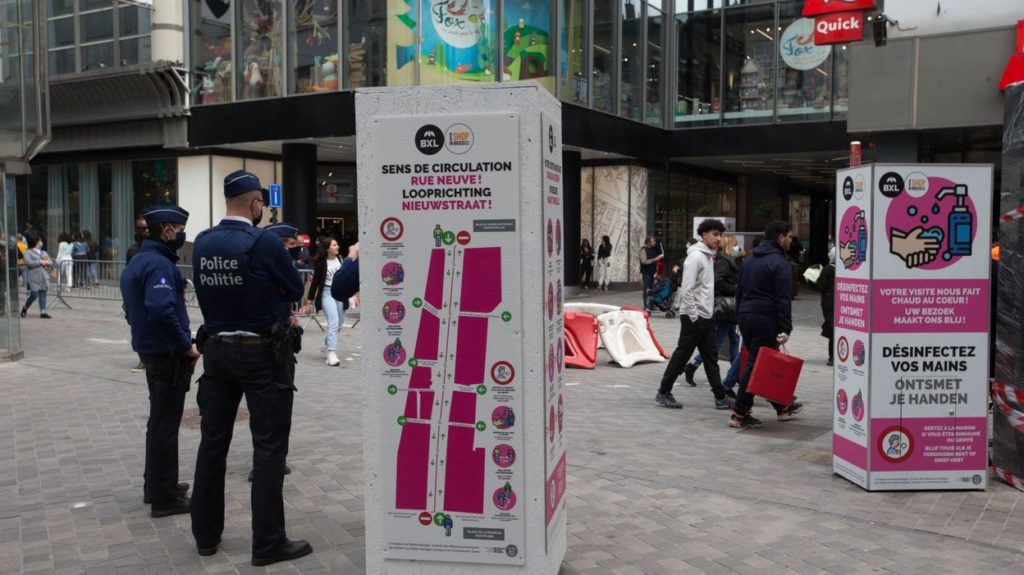As non-essential shops are allowed to open again from today, several big cities in Belgium are taking different measures to ensure that the reopening happens safely.
Together with the shopkeepers, cities and municipalities will have to guarantee safety in the shopping streets, Prime Minister Alexander De Croo announced during a press conference on Friday.
Vice Prime Minister Vincent Van Peteghem already stated that it should be "run-shopping, not fun-shopping" for customers, stressing the need to follow the basic rules, such as wearing a face mask, shopping alone, spending a maximum of half an hour in a shop, and keeping their distance.
In shopping streets, shopping centres and car parks across Belgium, town and city councils have to arrange everything in such a way that 1.5 metres can be kept between people at all times.
Brussels
The Rue Neuve is split in two by barriers, and customers are required to follow one-way navigation stickers and signs to move up and down the street.
Stewards and police officers will be present to monitor the situation. Additionally, the police can shut down some streets completely if necessary.
To avoid overcrowding on the central Grand Place, the number of visitors is limited and the square will be closed if it gets too crowded. Eating, drinking or smoking on the square is also forbidden to ensure that everyone wears their face mask at all times.
Related News
- 'No signals' that reopening Belgian shops will not happen safely
- Brussels to limit access, ban eating and smoking in Grand-Place
- Crisis Centre urges Belgians to shop online
Antwerp
At various entrance points to Antwerp City's biggest shopping street, the Meir, checks will be carried out to make sure not too many people enter at the same time. If it gets too crowded, the street will be closed off, mayor Bart De Wever said on Monday.
Violations of the coronavirus measures in or in front of a shop (such as not respecting the social distance) can lead to the closure of that shop.
Across the entire province of Antwerp, not only in the city, wearing a face mask in the shopping streets during opening hours is mandatory.
There are no additional measures for the shopping streets outside the historic centre. If adjustments are necessary, however, they will be made.
Leuven
The city is introducing a pressure barometer, allowing people to check how busy certain areas are in advance, based on a colour system, the city announced in a press release.
Extra stewards will be deployed to ensure that everything runs smoothly, and to raise people's awareness of measures such as walking directions and keeping a distance.
The Bondgenotenlaan, one of the city's major shopping streets, will be made car-free during the weekends, to free up more space for pedestrians and cyclists and make way for queues at shops.
Ghent
There will be a maximum of around 4,000 visitors to the Veldstraat and Langemunt, the two main shopping streets. Fences will guide the flow of visitors and a pressure barometer will show the visitor capacity.
Stewards will be deployed in the main shopping streets to make sure the maximum capacity per street is not exceeded. Additionally, fences will be placed at the entrance to the main shopping streets to temporarily close them off, if necessary.
The pressure barometer will indicate how busy it is, which will be communicated via the website and the social media of the city.
Bruges
The city launched a pressure barometer on its website, green is 'safe', orange means 'watch out and keep more distance', red means 'stay at home and wait a little.'
From Friday 4 December at 11:00 AM, the main shopping streets will be made car-free, and only shoppers will be allowed to enter on foot, in two walking directions. Cyclists and public transport will be diverted.
The police and stewards will monitor visitor numbers on cameras, and they can close shopping streets when it gets too crowded.
Additionally, the city will also provide public sanitary facilities at several locations throughout the centre.
Hasselt
The city indicated walking directions in the city centre, and stewards are present to remind people of the basic rules, such as respecting the social distance and hand hygiene.
The crowds are being monitored with surveillance cameras, and a live stream of the busiest places can be viewed on the city's website, so people can decide for themselves if they consider it too busy.
If it gets too crowded, streets may temporarily be closed off.
Maïthé Chini
The Brussels Times

